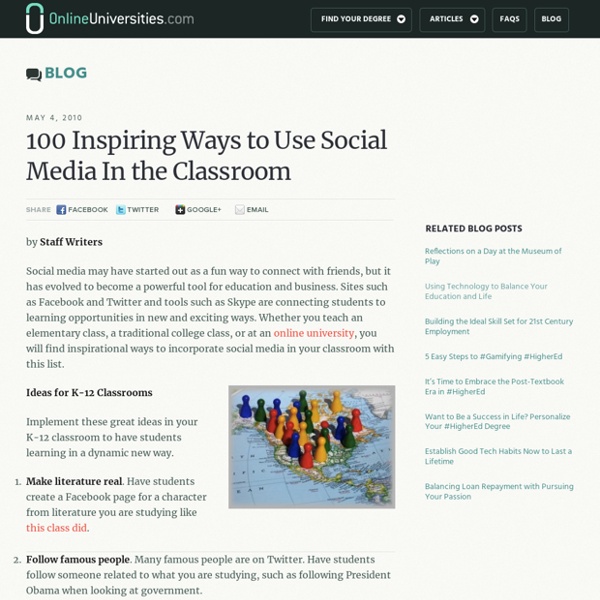More Spanish: Project based learning with grammar
I am concerned that I am spoon-feeding my students, boring the heck out of the really bright ones in the process, and not giving any of my students an opportunity to develop initiative for their own learning. So I wanted to see if I could apply project based learning to a grammar lesson. Most of the time, when I teach grammar, I explain the concept in a mini-lesson, and then select a variety of activities for my students to practice.
The Why and How of Using Facebook For Educators – No Need to be Friends At All!
If you are one of those out there that believe that Facebook has no place in the classroom, then, well maybe this post isn’t for you. But please first take a look at just a few reasons why you should reconsider: The fact is, the majority of your students and their parents are probably already on FacebookEven when schools have a policy against being “friends” online, there are tools you can use that won’t violate policyDespite what you may hear, there are strong privacy options that you can set up so only those that you want can access your informationWe have an obligation as educators to model appropriate online behavior and learn right along our students
Web 2.0 for the Under 13s crowd
Jul 05 As I lamented in my last post, many of the fabulous Web tools out there are restricted to users 13 and over. This limits what Elementary/Primary schools students can access online to create content to collaborate.
Top 5 Benefits of Technology in the Classroom
Resource Articles // Technology has transformed life as we know it, and the classroom looks much different than it did 50—or even 10—years ago. Traditional chalkboards have been replaced with digital whiteboards, and classrooms have a surplus of iPads. Is this advancement to the detriment of your students, or does it benefit their learning? According to the Pew Research Center, 92% of teachers said that the internet has a major impact on their ability to access content, resources, and materials.* Here are some of the ways educational technology improves the classroom experience:
Educators use Facebook with policy protections as resource for communication, learning
Staff photo by Cathy Cramer(From left:) Woodruff School Music Department students Sydnie DeRosa, Logan Riddle, Ariana Yamasaki, Joshua Ore, Danielle Basile and Timothy Venella post to the program's Facebook page with Woodruff School Music Department Director Spencer Lau. Social networking websites offer educators a world of opportunity for growth and communication, but, as lawsuits and horror stories have highlighted frighteningly often, they can also open doors to abuse and trouble. Despite the challenges of policing online content and interactions, many school districts are working to utilize resources such as Facebook in progressive ways that advance effective communications and learning while protecting students. “We have increased our communication and awareness between our school, our students and parents and our local community, business owners and sending schools,” said Jason Helder, principal of the Salem County Career and Technical High School.
99 Resources to Research & Mine the Invisible Web
College researchers often need more than Google and Wikipedia to get the job done. To find what you're looking for, it may be necessary to tap into the invisible web, the sites that don't get indexed by broad search engines. The following resources were designed to help you do just that, offering specialized search engines, directories, and more places to find the complex and obscure. Search Engines Whether you're looking for specific science research or business data, these search engines will point you in the right direction.
10 Reasons Today’s Students NEED Technology in the Classroom
Technology is everywhere--entwined in almost every part of our culture. It affects how we live, work, play, and most importantly learn. With mobile and other wireless devices like the IoT becoming an increasing requirement across every industry today, it only makes sense that our schools are also effectively deploying mobile technology in the classroom. However, for many schools, implementing the latest technology is a difficult strategy to navigate.
Schools use Facebook, Twitter to get out their message
Community forums and newsletters sent home in backpacks are so old school. You want to find out whether stewed tomatoes are on tomorrow's lunch menu? Check out the district's latest tweet. How about the date for the next school board meeting? Look on Facebook. Don't like a school district decision?
Media and Technology Resources for Educators
February 27, 2014 We are thrilled to announce the release of our entire Digital Literacy and Citizenship Curriculum as a set of eight interactive, multimedia iBooks Textbooks, available for free in the iBooks Store... read more March 31, 2014 Imagine … a school district that is teaching Digital Literacy and Citizenship lessons to 28,000 K-12 students, with 1,800 trained teachers. Is it possible? Last week, I hosted an inspiring webinar... read more
25 Easy Ways to Use Technology in the Classroom
Although many technology-based teaching methods and resources effectively engage students and build their skills, many educators encounter difficulties when using technology in the classroom. Maybe a specific platform is too hard to introduce. Or maybe it won’t run on your devices.




A great list of simple, quick suggestions for implementing social media in the classroom. There are a few English-specific entries, but any of them can be adapted to fit any content area. by brianbetteridge Jun 29